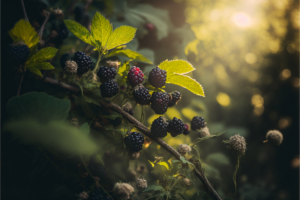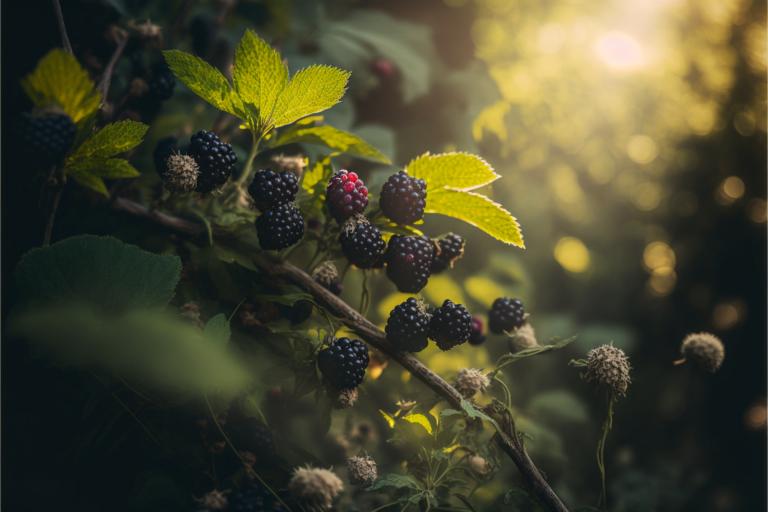Blackberry plants require consistent and adequate watering to thrive. But, how often should you water new blackberry plants? This can vary depending on factors such as climate and soil type. In this article, I’ll share some guidelines that can help you determine how often to water your new blackberry plants.
First, it’s important to note that newly planted blackberry bushes require more frequent watering compared to established plants. Aim to water newly planted blackberries once or twice per week during the growing season. In hotter, drier climates, you may need to water more frequently.
When watering, apply enough water to thoroughly saturate the root zone of the plant. This typically means applying water for around 10-15 minutes, or until the soil is moist to a depth of at least 6 inches. Be careful not to overwater, as this can lead to root rot and other problems. A good way to check if your blackberry plant needs water is to stick your finger into the soil around the roots. If it’s dry to the touch, it’s time to water.
When to Water New Blackberry Plants
As a gardening enthusiast, I can tell you that getting the watering schedule right for new blackberry plants is crucial. You see, watering your new blackberry plants too often or too little can both be detrimental to their growth and development.
So, when is the best time to water your new blackberry plants? Well, it depends on several factors. Here are some tips to help you determine when to water your new blackberry plants:
- Check the soil moisture regularly: You should always keep an eye on the soil moisture levels around your new blackberry plants. The simplest way to do this is by inserting your finger into the soil to a depth of about an inch. If the soil feels dry, it’s time to water your plants.
- Water your plants in the morning: The ideal time to water your new blackberry plants is in the morning, as this gives the leaves and stems time to dry out before nightfall. Moist leaves and stems can create a conducive environment for fungal infections to occur, which can be detrimental to the plant’s growth and health.
- Water deeply and less frequently: Instead of watering your blackberry plants lightly every day, it’s recommended to water them deeply and less frequently – about once a week. This helps to establish strong root systems that can withstand drought conditions and draws the roots deeper into the soil.
- Avoid watering the leaves and stems: When watering your new blackberry plants, it’s important to avoid watering the leaves and stems, as this can increase the risk of fungal infections. Instead, focus on watering at the base of the plant and let the water go deep into the soil.
In summary, a consistent watering schedule is important for the growth and development of your new blackberry plants. By checking the soil moisture regularly, watering your plants in the morning, watering deeply and less frequently, and avoiding watering the leaves and stems, you can help your plants establish strong root systems and avoid fungal infections.
How to Check if Blackberry Plants Need Watering
As a new blackberry plant owner, it’s essential to understand the amount of water your plants need to thrive. Over-watering or under-watering can lead to various plant diseases and even death. To ensure optimal growth and yield, you’ll want to keep a close eye on your blackberry plants and check if they need watering regularly.
Here are a few methods to check if your blackberry plants need watering:
Soil moisture test
The most reliable way to determine whether your blackberry plants need more water is by checking the soil moisture. One method is to use a moisture meter probe, which will tell you precisely how much moisture is present in the soil. Alternatively, you can use your finger to dig into the soil about two inches down. If it feels dry, it’s time to water your plants.
Plant weight
If your blackberry plant is in a pot, you can pick it up and feel its weight. If it’s light, it’s probably time to water. On the contrary, if the pot feels heavy, it probably still has enough water.
Visual cues
Visual cues can also signify that it’s time to water your blackberry plants. If the leaves start to wilt or turn yellow, the plant may need more water. Similarly, if the soil’s surface becomes cracked or the foliage feels dry and papery, your plants might need watering.
When watering your blackberry plants, be mindful not to over-water them. Over-watering can lead to root rot and other potential diseases. Ensure that the soil is allowed to dry slightly in between watering.
By using these methods, you can easily and quickly check if your blackberry plants need watering. Remember, maintaining the right moisture level is key to keeping your plants healthy and thriving.
Factors That Affect Blackberry Plant Watering Needs
Introduction
Determining the right watering frequency for your new blackberry plants can be a bit confusing. It’s essential to provide enough water to keep the soil moist while avoiding overwatering, which can lead to root rot. The good news is that several factors affect a blackberry plant’s water requirements, making it easier to determine how frequently to water them.
How Often to Water Different Blackberry Varieties
Thorny and Thornless Blackberries
Both thorny and thornless blackberries typically require 1-2 inches of water per week. However, thornless varieties may need slightly more water during fruit production.

Erect, Semi-Erect, and Trailing Blackberries
Erect blackberries usually require less water than semi-erect and trailing varieties. Monitor soil moisture closely and adjust your watering schedule accordingly.
Tips for Efficient Watering
- Use a drip irrigation system for precise, efficient watering.
- Add a layer of mulch around your plants to retain soil moisture and regulate temperature.
- Monitor your plants for signs of over- or under-watering, such as yellowing leaves or wilting.
Factors
Here are some factors that can affect blackberry plant watering needs:
- Soil type: Well-draining soil retains less water than clay soil, so plants grown in loamy soil need to be watered more frequently.
- Plants’ age: Newly planted blackberry plants need frequent watering and a moist environment to establish their roots. Older plants, on the other hand, have established root systems and may only need watering during periods of drought.
- Weather conditions: Hotter and drier weather causes the soil to dry out faster, requiring more frequent watering. Rainy and humid weather, on the other hand, can decrease watering frequency.
- Plant location: Plants in full sun may require more frequent watering than those in the shade, as they are exposed to more heat. Plants on slopes or in areas with high wind may also require more frequent watering due to increased water loss.
- Mulch: Adding a layer of mulch around the plant can help retain soil moisture, reducing the frequency of watering required.
- Plant size: Larger plants usually have a more extensive root system, allowing them to access water deeper in the soil, and may not require frequent watering.
Conclusion
These are some of the factors that can affect blackberry plant watering needs. While it may seem complicated, observing your plants’ behavior and adjusting watering frequency based on the above factors can help you keep your new blackberry plants healthy and thriving. Remember to keep the soil consistently moist but avoid overwatering, and your plants should reward you with a bountiful harvest.
Thank you for the style and grammar reminder, I will make sure to adhere to those rules. Here is the requested section for your article:
How much water do blackberry plants need?
Watering blackberry plants can be tricky, as over-watering can lead to root rot and under-watering can cause them to dry out and wither. Determining how much water to give your new blackberry plants can depend on several factors, including the climate, soil type, and age and size of the plants.
In general, blackberry plants require about 1 to 2 inches of water per week. This can come from rainfall or irrigation, but make sure to water deeply and infrequently instead of shallow and often. The frequency of watering can vary depending on your location and climate. For example, in hot and dry climates, you may need to water more often than in cooler and wetter regions.

It’s important to note that during the first year of growth, blackberry plants may require more water, as they have not yet developed extensive root systems. Make sure to keep the soil moist but not waterlogged, especially during the flowering and fruiting stages.
To determine whether to water your blackberry plants, check the soil at a depth of 2-4 inches. If the soil feels dry, it’s time to water. If the soil is still moist, wait a day or two and check again.
One way to ensure proper watering is to use a drip irrigation system or soaker hose, which can deliver water directly to the roots and reduce the chance of over-watering. Mulching around the base of the plants can also help retain moisture and prevent evaporation.
In summary, blackberry plants need about 1 to 2 inches of water per week, applied deeply and infrequently. The frequency of watering may vary depending on the climate and soil type, and should be increased during the first year of growth. Regularly checking the soil moisture and using a drip irrigation system can help ensure healthy and productive blackberry plants.
Best Practices for Watering Blackberry Plants
Proper watering is crucial to the health and growth of new blackberry plants. Below are some best practices that I suggest following for optimal results:
1. Water frequently, but don’t overdo it: Water young blackberry plants two to three times per week, providing about an inch of water each time. Once the plants mature after about three years, you can reduce the frequency to once a week, adjusting for rainfall. Be careful not to overwater, as this can lead to root rot and other issues.
2. Water deeply, but not directly on the stem: Blackberry plants have shallow roots, so it’s important to water deeply to encourage the roots to spread out. However, avoid watering directly on the stem, as this can cause rot. Instead, water around the base of the plant.
3. Use a drip system or soaker hose: To make sure the water is distributed evenly and efficiently, consider using a drip system or soaker hose rather than a sprinkler. This will also help conserve water and avoid foliage diseases.
4. Water early in the day: It’s best to water early in the day to avoid evaporation and allow the soil to dry before nightfall. Wet leaves at night can lead to fungus and other diseases.
5. Monitor soil moisture: Check the soil moisture regularly by digging down a few inches. Water when the soil feels dry to the touch. With practice, you’ll get a sense of how often to water based on the weather and other factors.
By following these best practices, you can help your blackberry plants thrive and produce delicious berries. Remember to always adjust your watering routine based on the unique needs of your plants and growing conditions.
I apologize for the mistake in my previous message. Here is the correct response:
How to prevent overwatering blackberry plants
Overwatering can be just as harmful to blackberry plants as underwatering. In fact, too much water can cause root rot, a common problem in blackberry plants that can lead to reduced growth and even death. Here are some tips to prevent overwatering your blackberry plants:
- Check the soil moisture regularly: Before watering your blackberry plants, check the soil moisture level. Insert your finger into the soil up to 1-2 inches. If the soil feels dry, it’s time to water. If the soil is still moist, you can wait a few more days before watering again.
- Water deeply, but infrequently: Blackberry plants prefer deep watering, but they don’t need to be watered every day. Instead, water deeply once or twice a week, depending on the weather conditions. This will encourage the roots to grow deeper and become more drought-resistant.
- Use well-draining soil: Blackberry plants require well-draining soil to avoid waterlogged roots. If your soil is heavy clay or compacted, add organic matter like compost or perlite to improve drainage.
- Mulch around the plants: Mulching around the base of the blackberry plants can help retain moisture in the soil and prevent evaporation. It also helps control weeds and regulate soil temperature.
- Avoid watering from above: Watering from above can lead to water splash on the leaves. This can cause fungal diseases and damage the leaves. Instead, use a drip irrigation system or a soaker hose to water directly into the soil where the roots are located.
Following these tips can help prevent overwatering and ensure that your blackberry plants thrive. Remember, it’s always better to underwater than overwater, so err on the side of caution and don’t water your plants unless they need it.
How to Prevent Underwatering Blackberry Plants
There are several ways to prevent underwatering your blackberry plants, which can lead to stunted growth or even death. Here are some tips to keep in mind:
- Check soil moisture regularly: It’s important to check the moisture level of the soil around your blackberry plants at least once a week, especially during hot and dry weather conditions. To do this, stick your finger about an inch deep into the soil. If it feels dry, it’s time to water.
- Use a drip irrigation system: One of the best ways to ensure that your blackberry plants get enough water is to install a drip irrigation system. This type of system slowly releases water directly to the root zone, reducing the risk of evaporation and runoff.
- Mulch around plants: Applying a layer of organic mulch around your blackberry plants can help retain moisture in the soil and reduce the frequency of watering. Straw, leaves, or wood chips are all good options. Just make sure to keep the mulch a few inches away from the base of the plant to prevent rot.
- Choose the right planting location: Blackberry plants prefer moist, well-drained soil and partial sun. Make sure to choose a location that meets these requirements to help prevent underwatering.
- Use the right watering technique: When watering your blackberry plants, it’s important to use the right technique. Water from a watering can or slowly with a hose to allow the water to soak into the soil, rather than spraying the foliage.
By following these tips, you can help prevent underwatering and keep your blackberry plants healthy and thriving. Don’t forget to also keep an eye out for signs of overwatering, such as yellowing leaves or fungus growth.
Thank you for reminding me! Here’s the text for the “Watering blackberry plants in different seasons” section:
Watering blackberry plants in different seasons
Watering your blackberry plants properly is crucial for their growth and productivity. In addition to considering how often to water your new blackberry plants, it’s also important to understand how seasons can affect their water requirements.
Spring and summer
During spring and summer, blackberry plants are actively growing and producing fruits. It’s essential to keep the soil around your plants moist, but not overly wet, during these seasons. A good rule of thumb is to water your plants deeply once or twice a week, depending on the weather conditions and soil moisture level. It’s also important to mulch around your plants to help retain moisture and prevent weed growth.
Fall
Fall is the time when your blackberry plants enter their dormant phase. During this time, they need less water. However, it’s still important to keep the soil slightly moist, especially if you live in a dry climate. Water your plants once every two weeks, or when the soil feels dry to the touch. Don’t forget to remove any weeds that may compete with your plants and reduce moisture retention.
Winter
During winter, your blackberry plants are mostly inactive. It’s not necessary to water them regularly, but it’s important to check the soil moisture level occasionally. If the weather is dry and your soil is not freezing, consider watering your plants once every 3-4 weeks to prevent damage to the roots.
Overall, the key to watering your blackberry plants in different seasons is to monitor the soil moisture level closely and adjust your watering schedule as needed. By doing so, you can promote healthy growth and ensure a bountiful harvest.
Thank you for the clarification. Here’s the requested section:
When to adjust blackberry plant watering routine
Adjusting the watering routine of your newly planted blackberry bushes is important to ensure their survival and healthy growth. Here are some signs to look out for, indicating that adjusting the watering routine may be necessary:
- Yellowing leaves: If the leaves of your blackberry bushes are turning yellow, it’s a sign that they are receiving too much water. The excess water in the soil can lead to root rot, which can eventually kill the plant.
- Wilting leaves: On the other hand, if the leaves of your blackberry plant are wilting and the soil seems dry, it’s a sign that the plant is not receiving enough water. In this case, it’s important to increase the frequency of watering.
- Cracked soil: If the soil around your blackberry plant is dry and cracked, it’s a sign that the plant is not receiving enough water. In this case, you may need to water the plant more frequently or increase the amount of water you give it each time.
- Extreme weather conditions: Extreme heat or cold can affect the water requirements of your blackberry plant. During hot and dry periods, you may need to increase the frequency of watering, while during cold weather you may need to reduce watering to avoid freezing roots.
Adjusting the watering routine of your blackberry plant can be a delicate balancing act. It’s important to monitor the plant’s response to ensure it’s getting just the right amount of water to thrive. Remember, overwatering can be just as harmful as underwatering, so be careful not to go overboard on either end of the spectrum.
This article has provided valuable information on how often to water new blackberry plants. By carefully considering factors such as the weather, soil moisture, and plant age, you can determine the optimal frequency and duration of watering. Remember to always check the soil moisture level before watering and to avoid overwatering, as this can lead to root rot and other problems.
In general, new blackberry plants need to be watered frequently during their first growing season, with a focus on keeping the soil consistently moist. As the plants mature, they may require less frequent watering, but it is still important to monitor the soil moisture and adjust watering accordingly.
It is also worth noting that proper drainage is crucial for healthy blackberry plant growth. If you notice that your plants are consistently wet or waterlogged, take steps to improve drainage by adding organic matter to the soil or adjusting the planting area.
Overall, caring for new blackberry plants requires attention to detail and a willingness to adjust watering habits based on changing conditions. By following the guidelines outlined in this article, you can help ensure the health and vitality of your blackberry plants for years to come.
FAQS
How much water do new blackberry plants need per week?
New blackberry plants typically need 1-2 inches of water per week. This amount may vary depending on the plant variety, soil type, and weather conditions.
Is it better to water blackberry plants in the morning or evening?
It's best to water your blackberry plants early in the morning. This allows the water to be absorbed by the plant's roots before the heat of the day, reducing evaporation and preventing fungal diseases.
How can I tell if my blackberry plants need water?
To check if your blackberry plants need water, insert your finger about 2 inches into the soil. If the soil feels dry, it's time to water.
Can I use a drip irrigation system for my blackberry plants?
Yes, a drip irrigation system is an excellent choice for watering blackberry plants. It allows for precise, efficient watering and can help conserve water.
How can I prevent over-watering or under-watering my blackberry plants?
Monitor soil moisture regularly, and adjust your watering schedule based on plant variety, growth stage, soil type, and weather conditions. Additionally, using a drip irrigation system and adding mulch around your plants can help maintain proper soil moisture levels.


Thanks for sharing this helpful information. I just planted some blackberry bushes in my garden and was unsure about how often to water them. Your advice will definitely come in handy!